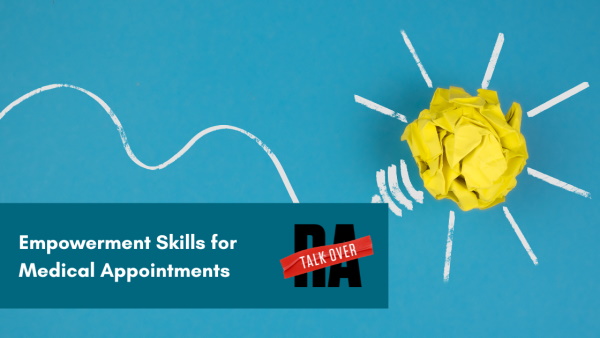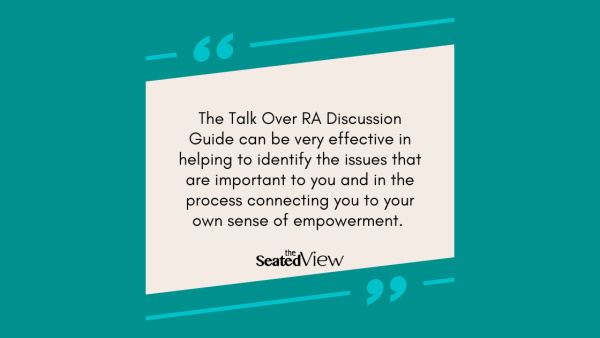Talk Over RA: How to Feel Empowered in Conversations with Your Rheumatologist

Seeing a doctor is a stressful experience. There’s only a short time in which to convey your concerns and questions and your doctor has their own list of issues to cover. Becoming empowered to act as a partner in the process is an important part of living with rheumatoid arthritis (RA) but can take years to learn on your own. In this post, I share information about how to learn the skills you need and share tips on how you can use empowerment in your next appointment with your rheumatologist.

Why Is It Important to Be Empowered With RA?
Empowerment is a process that “helps people gain control over their own lives and increases their capacity to act on issues that they themselves define as important.” It really is that simple, but also that complicated.
Healthcare developed with a hierarchical structure. In the past, being a doctor was about as close to being God as you could get, and patients were passive and obedient recipients of care. This is still reflected in the words we use in healthcare, including doctors’ “orders” and patient “compliance” with medication (that is, are you following your doctor’s orders). That might work if you have strep throat or a broken ankle, but hardly ever when you have a chronic illness like RA.

RA affects all your life. Finding a way to live well with RA is about having clarity about your goals for treatment, as well as your life goals, and then coordinating your medical care with all the other things you do to manage your illness. Your active participation is essential in discussions around treatment goals, effectiveness of treatment, and how these connect to your life goals. Studies have shown that chronic illness can be managed more effectively when people living with the condition take an active role and many doctors are supportive of this. But don’t wait for someone else to give you the mic (so to speak). Living well with this condition relies on finding the confidence to be not just a partner in the process, but actually taking the lead in all areas of your life affected by RA, including in your rheumatologist’s office.

Empowerment Skills for Medical Appointments
Becoming empowered is often discussed as something that is given to you, but you already have this power within you. Developing your RA skill set can help you find the confidence to use that empowerment. And this is where the Talk Over RA website can help.

Important components of empowerment include educating yourself about RA so you can make truly informed decisions. This develops your health literacy skills, so you know for instance, why your doctor is recommending a certain type of treatment or lifestyle change. Since you are reading this on my website, you probably have the digital literacy skills to find this kind of information online, which can be a valuable resource as you get to know your RA.
But information is just the beginning. You also need to tap into your sense of self-efficacy, that is, believing that you can make the changes necessary to get closer to your goals. Information helps you build a foundation but coming to believe that you have the ability to affect what happens in your medical care is the moment when you change from passive patient to an empowered one. It helps you change the dialogue with your doctors to one based in shared decision-making and begin to build a relationship of mutual respect and teamwork.

How to Be Empowered with Your Rheumatologist
There are many sites that have credible information and Talk Over RA is one of my favourites. It has information about how RA affects those of us who live with it, as well as tips on talking to your doctor, and in combination with your symptom tracking results, it’s a fantastic tool to prepare for your appointment. The Talk Over RA Discussion Guide can be very effective in helping to identify the issues that are important to you and in the process connecting you to your own sense of empowerment. When you know what those issues are and share them with your doctor, the relationship shifts to a teamwork model and informs your discussion about treatments that will support your life goals.

Since the first year I was part of the Talk Over RA conversation, I’ve used that Discussion Guide every time I see a doctor. It’s incredibly helpful in conversations with my rheumatologist, but here’s a Pro Tip: use it for all of your doctors. Take some time a day or two before your appointment to fill out the form, summarizing your symptoms, your issues, the effects of your current treatments, as well as your goals both for your treatment and your life. I usually make two copies, one for my doctor and the other for me to have as a reference and a place to make notes. This document helps set the agenda for the appointment, helps me to remember my questions, and keeps me focused on what I need for my doctor. And that creates a situation in which I can lean in to my empowerment.
Check out Talk over RA for more information and tips on talking to your doctor and others about your experience.
This post was made possible by a Talk Over RA partnership. All opinions are my own.
See My References
Empowerment for People with Chronic Illness. “What Is Patient Empowerment?” European Patient Forum. https://www.eu-patient.eu/policy/Policy/patient-empowerment/.
Chronic illness can be managed more effectively when people living with the condition take an active role. Tilkin, De Winter, Ketterer, Etienne, Vanmeerbeek, and Schoenaers. “Considering Patients’ Empowerment in Chronic Care Management: A Cross-Level Approach.” European Journal of Investigation in Health, Psychology and Education 10, no. 1 (2019): 134–42. https://doi.org/10.3390/ejihpe10010012.
Important components of empowerment. Marie Ennis-O’ConnorA Stanford Medicine X e-Patient scholar, and Marie Ennis-O’Connor. “What Is Patient Empowerment: Benefits of Patient Empowerment.” Patient Empowerment Network. Marie Ennis-O’Connor https://powerfulpatients.org/2018/05/22/what-does-it-mean-to-be-an-empowered-patient/.

1 Comment
Read More
Discover what else I've been writing about...
















Such a terrific guide Lene. It is an important addition to the literature.